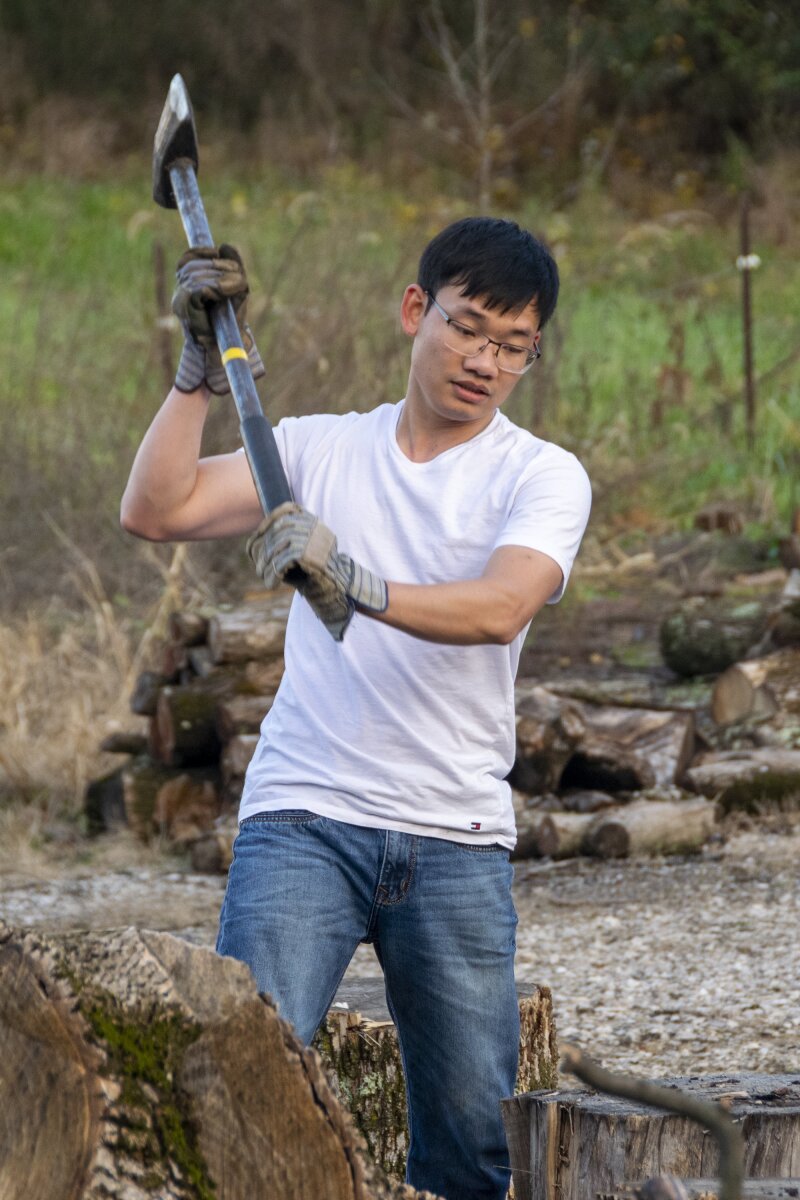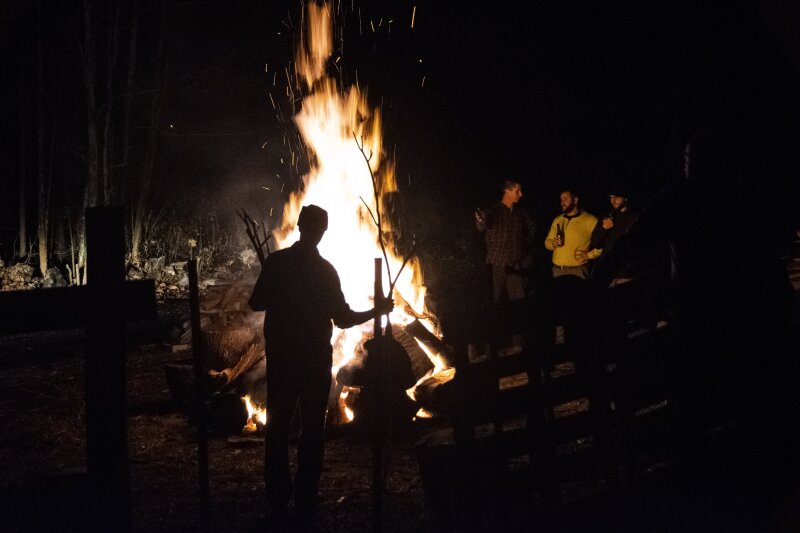
INDIANA SEMINARIANS CHOP WOOD TO HELP RURAL NEIGHBORS STAY WARM
Sean Gallagher/Catholic News Service Â
01/14/2022
INDIANAPOLIS (CNS) — What does a seminarian do to prepare for priestly ministry?

Hung Van Tran, a seminarian for the Archdiocese of Hanoi,
Vietnam, chops wood for a bonfire at St. Meinrad Seminary
and School of Theology in St. Meinrad, Ind., Nov. 12, 2021.
CNS photo/courtesy St. Meinrad Archabbey via The Criterion
Pray. Check. Take theology classes. Check. Minister in parishes, hospitals, nursing homes and prisons. Check. Cut down trees and split wood.
Wait, what?
But that's exactly what happens at St. Meinrad Seminary and School of Theology in St. Meinrad. For more than 40 years, the seminarians have volunteered in what is now called Project Warm, which provides firewood to people in need in Indiana.
They collect wood from donors in the area, split it up on the grounds of the seminary and then deliver it to people who need it to keep their homes warm.
In the process, the seminarians build up fraternity among themselves, gain experience in serving those in need and learn about the often-hidden challenge of rural poverty — all things that will serve them well when they begin service as priests in their home dioceses.
"It's good pastoral formation," said seminarian Isaac Siefker, a member of St. John the Apostle Parish in Bloomington. "I would say that I get almost as much out of this volunteer work as I do out of my assigned ministry. I've enjoyed the work. I love the manual labor. Even more than that, I love going to people's houses when we deliver wood."
Seminarian Tyler Huber, a member of St. Mary-of-the-Knobs Parish in Floyd Knobs, said he recognizes how much the project has helped him serve the deeper needs of those who ask for their help.
"Yes, they're struggling with poverty," he said. "They're needing resources, and we're helping them in that way. But so many of them can just use someone to be present to them. That's one of my favorite pieces to it," he told The Criterion, archdiocesan newspaper of Indianapolis.
Over the course of an academic year, typically more than half the seminarians volunteer for Project Warm in various ways either in collecting wood, chopping it, or delivering it.
They receive training for their work and follow safety protocols.
The work is second nature for Eli Yandow, a seminarian for the Diocese of Burlington, Vermont, who grew up on a dairy farm just south of the Canadian border where his family heats their home entirely by wood.
"It felt like being at home out chopping wood," said Yandow, the project's general manager this year.
In overseeing all the work of the project, Yandow, in his fourth year of formation, can see how it benefits the seminarians, especially in what he calls the "brotherhood of the wood lot crew."

Seminarians are seen around a bonfire at St. Meinrad Seminary
and School of Theology in St. Meinrad, Ind., Nov. 12, 2021.
CNS photo/courtesy St. Meinrad Archabbey via The Criterion
In addition to spending time splitting wood, the seminarians also get together for fellowship during a monthly bonfire. They also are intentional about turning their work into prayer which includes praying for the families they serve.
Teresa Shephard and her 6-year-old daughter, who benefit from Project Warm, described the seminarians as "good home folk. They work hard packing in the wood. They're good kids, willing to help out."
She also sees how this work can prepare them for parish ministry.
"It shows these guys what life's really like," Shephard said. "They have to know what it's like, what people are really going through in order to help them. If they're not out there getting their hands dirty themselves, if they're not putting themselves in our place, how are they going to help people?"
Benedictine Father Anthony Vinson, pastor of St. Meinrad Parish in St. Meinrad and St. Boniface Parish in Fulda, has led Project Warm since 2004.
He praises the "zeal to serve" that he sees in the seminarians who volunteer in the project.
"Many of them want to get dirty and have taken to heart what Pope Francis said, that they should 'smell like their sheep,'" said Father Vinson. "That is huge."
At the same time, he noted that it can take time and experience for seminarians to know the sometimes-fine nuances of serving people living in poverty in rural areas.
"In rural areas, people like to be self-sufficient," said Father Vinson. "There's a certain level of pride there."
That's something Shephard knows. As she put it: "We're so used to doing things for ourselves that it's hard to ask for help. We're country."
Yandow appreciates this pride, but he also values the physical need the seminarians are meeting.
"We dump a load of wood, and we know that that person is going to have heat," he said, adding that he and fellow seminarians also see the connection between serving people's physical and spiritual needs.
"We also need to be able, in every aspect of our life, to be the presence of Jesus Christ," he said.
-
